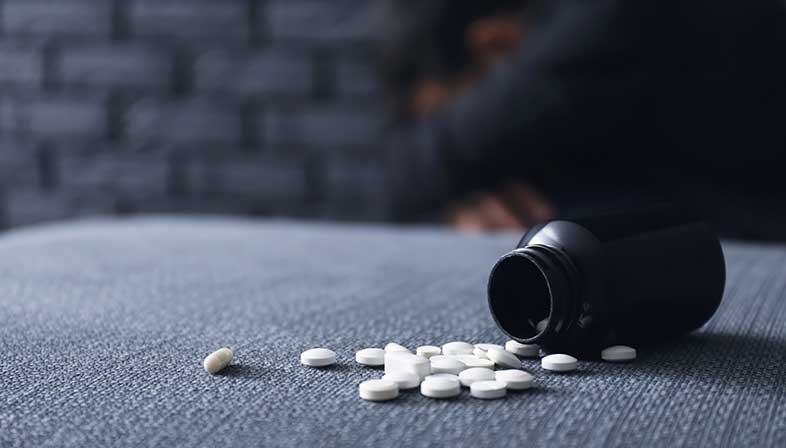Many young people experiment with drugs due to peer pressure. Other people try drugs to self-medicate mental health problems like depression and anxiety.
No matter the reason, drug experimentation can quickly lead to drug addiction (also called substance use disorder). Here’s how.
What Does It Mean To Experiment With Drugs?
Experimenting with drugs means using a drug in a way that can harm your health. For example, you might use an illegal drug or use a prescription drug in a manner not prescribed by your healthcare provider.
Certain risk factors make you more likely to experiment with drugs. These include:
- stress
- low self-esteem
- mental health disorders
- early exposure to drug abuse
- family history of drug abuse and addiction
How Experimenting With Drugs Turns Into Addiction
Drug abuse floods your brain with dopamine. Dopamine is a neurotransmitter (brain chemical) associated with pleasure, reward, and motivation. Your brain naturally produces it during pleasurable activities like eating, having sex, and exercising.
However, when regular drug abuse overloads your brain with dopamine, your body will start producing less of it. You will then find it difficult to feel pleasure without drugs.
You may also need increasingly larger or more frequent doses of a drug to feel the desired effects. This is called developing a tolerance.
Tolerance, Dependence, & Withdrawal
In addition, if you go without drugs for too long, you may experience unpleasant withdrawal symptoms, such as anxiety, shaking, and trouble sleeping. This is called physical dependence. It occurs when your brain starts relying on drugs to function properly.
Both tolerance and physical dependence are symptoms of addiction. Other symptoms include:
- intense drug cravings
- mood swings
- irritability
- isolation from friends and family members
- loss of motivation
- loss of interest in activities once enjoyed
Loss Of Control
Once you develop an addiction, you will likely feel unable to stop using drugs even when your drug use causes negative consequences, such as damaged relationships and job loss.
That’s because addiction physically changes areas of your brain associated with behavior control, judgment, and decision-making.
How Quickly Can Drug Experimentation Lead To Addiction?
The amount of time it takes for drug experimentation to turn into addiction depends on a variety of factors, including:
Age
In general, the younger you are when you start experimenting with drugs, the more quickly you may develop an addiction.
When you’re young, your brain is still developing, which can make it difficult to control your impulses. This impulsivity can quickly lead to repeated drug abuse and addiction.
Genetics
Some people are biologically more susceptible to addiction than others. That’s why some people can drink alcohol in moderation, while others find it impossible to only have one drink.
If you have a family history of addiction, even a small amount of drug experimentation can rapidly turn into a disease.
Type Of Drug
In most cases, the more powerful a drug is, the faster you can become addicted to it.
For instance, people who use methamphetamine, cocaine, or heroin typically develop addictions more quickly than people who use less potent drugs. Still, it’s important to remember that misusing any drug can lead to addiction.
Other Risks Of Drug Experimentation
If you try drugs and don’t develop an addiction, you might think your behavior is harmless. However, experimenting with drugs poses many other health risks besides addiction.
Accidents & Risky Behaviors
For example, if you drive while intoxicated, you could cause a deadly car crash.
Drugs also make you more likely to engage in other risky behaviors.
For example, you may share needles or other drug paraphernalia, which can lead to infectious diseases like HIV and hepatitis C. You might also have unprotected sex, which can lead to unwanted pregnancies and sexually transmitted diseases.
Mental Health Issues
In addition, drug abuse can make you moody, irritable, and even aggressive. These effects make it difficult to maintain healthy relationships. Drugs can also worsen existing mental health issues, increasing your risk of self-harm and suicide.
Risk Of Overdose
Finally, many people who experiment with drugs die of overdoses. You might think you can avoid an overdose by limiting the amount of drugs you use at one time.
However, many street drugs are laced with highly potent drugs such as fentanyl. Even small doses of these substances can kill you.
Treatment Options For Drug Abuse & Addiction
If you or a loved one feels unable to stop abusing drugs, seek professional help at an addiction treatment program. These programs provide recovery-focused services such as:
- mental health counseling, where you can learn how to manage drug cravings and strengthen your mental health
- medical detox, where doctors can help you safely stop using drugs with minimal withdrawal symptoms
- support groups, where you can share your experiences and coping tips with other people in recovery
To learn more about substance abuse treatment options, please contact Northeast Addictions Treatment Center. Our compassionate health care providers offer a variety of evidence-based outpatient treatments to help you stay sober and healthy.
Keep Reading:
Sources:
National Institute on Drug Abuse — Drugs, Brains, and Behavior: The Science of Addiction
Substance Abuse and Mental Health Services Administration — Know the Risks of Using Drugs
United States Department of Health and Human Services — The Neurobiology of Substance Use, Misuse, and Addiction
United States National Library of Medicine — Overdose


